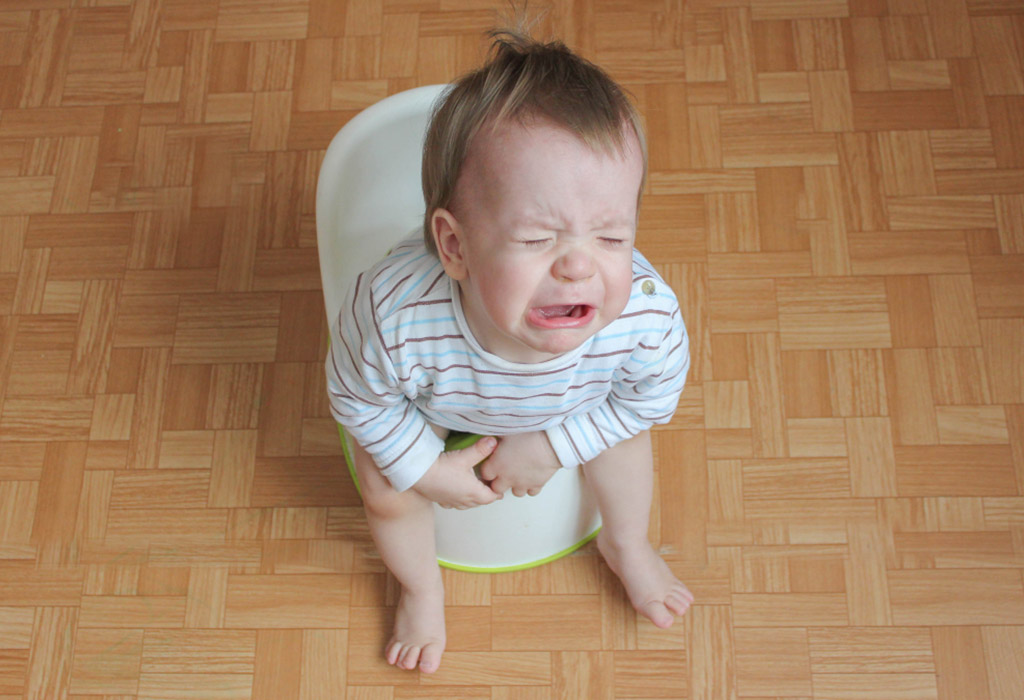Constipation is when a child passes very hard stools and has fewer bowel movements than he or she normally does. It is a very common problem. Everyone’s bowel habits are different. Some children may go daily, others up to every 3 days. What is normal for one child may not be for another. What is important to remember is that no matter how often your child passes a stool, it should not hurt when they do. Common causes include early toilet training and changes in diet. Fortunately, most cases of constipation in children are temporary. Treatment will depend on your child’s symptoms, age, and general health. It will also depend on how severe the condition is. Treatment may initially include diet and lifestyle changes. Your doctor may consider laxatives depending on how severe the symptoms are.
Signs and symptoms:
Symptoms can occur a bit differently in each child. They may include:
- Not having a bowel movement for a few days
- Passing hard, dry stools
- Having belly (abdominal) bloating, cramps, or pain
- Not feeling hungry
- Showing signs of trying to hold stool in, such as clenching teeth, crossing legs, squeezing buttocks together, turning red in the face
- Small liquid or soft stool marks on a child's underwear
When to see a doctor?
Constipation in children usually isn't serious. However, chronic constipation may lead to complications or signal an underlying condition. Take your child to a doctor if constipation lasts longer than two weeks or is accompanied by:
- Fever
- Not eating
- Blood in the stool
- Abdominal swelling
- Weight loss
- Pain during bowel movements
- Part of the intestine coming out of the anus (rectal prolapse)
بچوں میں قبض
قبض اس وقت ہوتی ہے جب بچہ بہت سخت پاخانہ کرتا ہے ، اور اس کی آنتوں کی حرکت سست ہوتی ہے ۔ یہ ایک بہت عام مسئلہ ہے۔ ہر ایک کی پاخانہ کرنے کی عادتیں مختلف ہوتی ہیں۔ کچھ بچے روزانہ کرتے ہیں ، اور بچے ہر تیسرے دن تک۔ جو ایک بچے کے لیے عام ہے وہ دوسرے کے لیے نارمل نہیں بھی ہو سکتا۔ جو بات یاد رکھنا ضروری ہے وہ یہ ہے کہ آپ کا بچہ جب بھی پاخانہ کرے ، اس کو تکلیف نہیں ہونی چاہیے۔ عام وجوہات میں بیت الخلا کی ابتدائی تربیت اور خوراک میں تبدیلیاں شامل ہیں۔ خوش قسمتی سے ، بچوں میں قبض کے زیادہ تر معاملات عارضی ہوتے ہیں۔ علاج کیسے کرنا ہے، یہ آپ کے بچے کی علامات ، عمر اور صحت پر منحصر ہوگا۔ یہ اس بات پر بھی منحصر ہوگا کہ قبض کتنی شدید ہے۔ علاج میں ابتدائی طور پر خوراک اور طرز زندگی میں تبدیلیاں شامل ہو سکتی ہیں۔ آپ کا ڈاکٹر ادویات پر بھی غور کرسکتا ہے اگر علامات زیادہ شدید ہیں۔
نشانات و علامات
علامات ہر بچے میں تھوڑی مختلف ہو سکتی ہیں۔ ان میں شامل ہو سکتے ہیں
- کچھ دنوں تک پاخانہ نہ آنا۔
- سخت ، خشک پاخانہ آنا۔
- پیٹ پھولنا یا درد ہونا۔
- بھوک نہیں لگنا۔
پاخانہ خارج کرنے کی کوشش کے آثار دکھانا ، جیسے دانت کچکچانا ، ٹانگیں کراس کرنا ، چہرہ سرخ ہونا
- بچے کے انڈرویئر پر چھوٹے یا نرم پاخانے کے نشانات۔
ڈاکٹر سے کب ملنا ہے۔
بچوں میں قبض عام طور پر سنگین نہیں ہوتا ہے۔ تاہم ، دائمی قبض پیچیدگیوں کا باعث بن سکتا ہے یا کسی بنیادی حالت کی نشاندہی کرسکتا ہے۔ اپنے بچے کو ڈاکٹر کے پاس لے جائیں اگر قبض دو ہفتوں سے زیادہ رہتا ہے یا اس کے ساتھ یہ علامات ہوتی ہیں:
- بخار
- بچہ صحیح سے کھانا نہیں کھا رہا۔
- پاخانہ میں خون۔
- پیٹ کی سوزش۔
- وزن میں غیر ارادی کمی
- آنتوں کی حرکت کے دوران درد۔
- آنت کا کچھ حصہ پاخانہ والی جگہ سے نکلتا ہے۔ (prolapse)
Doctors to consult (Gastroenterologist):
Dr Inamullah Khan, Prof. Dr. Qurratul Ain Hyder, Dr. Zulqarnain Khan Haider
Note: Click the Doctor's name to make an appointment.
Reference:
https://www.hopkinsmedicine.org/health/conditions-and-diseases/constipation-in-children
https://patient.info/digestive-health/constipation/constipation-in-children

